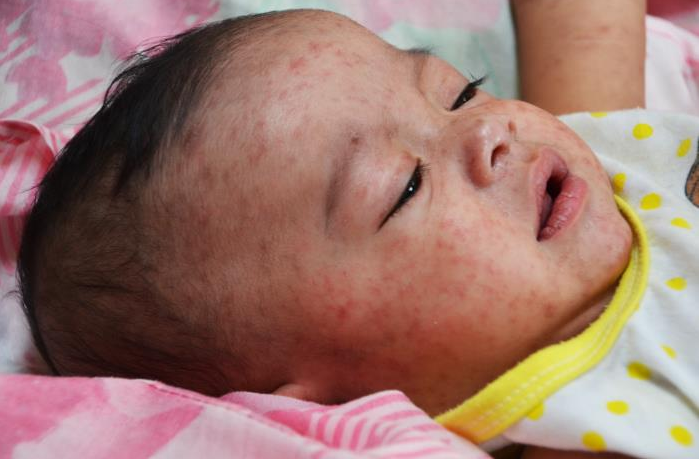
BY TOM CLANCEY
OF PASCACK PRESS
HILLSDALE, N.J.—Where were you on Feb. 18? If you visited two identified Hillsdale businesses, health officials warn you may have been exposed to the highly contagious disease measles.
Call your health provider—to avoid spreading infection, don’t just show up at an emergency room—if on that day you were at AFC Urgent Care, 2 Broadway, between 2 and 5 p.m. or at Walgreens Pharmacy, 383 Washington Ave., between 3 and 5:30 p.m., New Jersey health officials said.
“If you have been exposed, you are at risk if you have not been vaccinated or have not had measles,” said a Feb. 26 state-issued public health alert. Individuals potentially exposed, if infected, could develop symptoms as late as March 18, the alert said.
“Special arrangements can be made for evaluation while also protecting other patients and medical staff from possible infection,” the health department added.
The individual confirmed to have measles could have exposed others to the infection while in Bergen County Feb. 17–25, the health department said.
“Testing at the CDC [the Centers for Disease Control and Prevention] has confirmed the infection,” said the health department. “The individual, who is a New Jersey resident, had recent contact with a community outside New Jersey experiencing an ongoing outbreak of measles.”
According to the CDC, measles starts with a fever that can get very high, and can include cough, runny nose, red eyes, a rash of tiny red spots that starts at the head then spreads, diarrhea or ear infection.
Measles can be dangerous, especially for babies and young children, said the CDC. It said the disease can lead to pneumonia (one out of 20 children with measles), brain damage or deafness (one out of 1,000), or death (one or two out of 1,000).
Outbreaks abroad, and at home
This year by Feb. 21 there have been 159 individual cases of measles in 10 states, CDC said.
Data shows the vast majority of these confirmed cases are in Rockland County, N.Y.
“Every year, unvaccinated U.S. residents get measles while they are abroad and bring the disease into the United States and spread it to others,” says the CDC.
About 20 million people get measles worldwide each year; it’s common in Europe, Asia, the Pacific Island and Africa, according to the CDC.
Pascack Valley had another recent scare with measles after an international traveler infected with measles, returning from Israel, stopped by Lifetime Gym in Montvale, on Oct. 5, 2018, New York health officials said.
That person also visited six locations in Rockland County, N.Y., officials said.
The Journal News of Westchester County, N.Y., reported Jan. 18 that Rockland County Health Commissioner Dr. Patricia Schnabel Ruppert said the measles outbreak there that began in October 2018 was spreading in part by families not cooperating or reporting cases.
“All of the Rockland cases have affected Orthodox Jews in Spring Valley, Monsey and New Square, although health officials caution that due to the small geographic nature of the county, anyone who is not immunized is susceptible,” The Journal News reported.
As of Feb. 27, there were 139 confirmed cases of measles in Rockland County, and 81.5 percent of those patients had zero measles-mumps-rubella (MMR) vaccinations, the nearby New York county reported.
Confirmed cases brings renewed call to vaccinate
The CDC reports the best way to protect against measles is to get the MMR shot and that doctors recommend all children get it.
“MMR shot is very safe, and it is effective at preventing measles (as well as mumps and rubella),” says the CDC. “Vaccines, like any medicine, can have side effects. But most children who get the MMR shot have no side effects.
“The side effects that do occur are usually very mild, such as a fever, rash, soreness or swelling where the shot was given, or temporary pain and stiffness in the joints (mostly in teens and adults),” says the CDC.
“More serious side effects are rare. These may include high fever that could cause a seizure,” says the CDC.
In Rockland County, since the outbreak, The Journal news reports that more than 14,000 people were given MMR immunizations.
After the Hillsdale case was confirmed, New Jersey health officials said anyone who has not been vaccinated or has not had measles is at risk if they are exposed.
“Two doses of measles vaccine are about 97 percent effective in preventing measles,” said Dr. Christina Tan, state epidemiologist. “We urge everyone to check to make sure they and their family members are up-to-date on measles/mumps/rubella (MMR) vaccine and all other age-appropriate immunizations.
“Getting vaccinated not only protects you, it protects others around you who are too young to get the vaccine or can’t receive it for medical reasons,” Tan said.
The New York Times reported Feb. 22 that Japan’s Miroku Community Kyusei Shinkyo, a religious group that promotes alternative healing, had recently apologized for not following public health officials advice to get vaccinated after a recent outbreak there of 49 measles cases, mostly affecting its members.
The CDC firmly denies widely criticized online speculation that MMR vaccinations may be linked to Autism Spectrum Disorder (ASD)—a disorder that occurs disproportionately in New Jersey children, at one in 34, the highest rate in the nation—asking, “Is there a link between the MMR shot and autism?” and answering, “No.”
“Scientists in the United States and other countries have carefully studied the MMR shot. None has found a link between autism and the MMR shot,” the CDC says, which adds the cause of ASD is unknown but believed to have a correlation between genetic, biologic and environmental factors.
